| Article ID | Journal | Published Year | Pages | File Type |
|---|---|---|---|---|
| 2486322 | Journal of Pharmaceutical Sciences | 2011 | 13 Pages |
Abstract
Quality by design (QbD) is a scienceâ and riskâbased approach to drug product development. Although pharmaceutical companies have historically used many of the same principles during development, this knowledge was not always formally captured or proactively submitted to regulators. In recent years, the US Food and Drug Administration has also recognized the need for more controls in the drug manufacturing processes, especially for biological therapeutics, and it has recently launched an initiative for Pharmaceutical Quality for the 21st Century to modernize pharmaceutical manufacturing and improve product quality. In the biopharmaceutical world, the QbD efforts have been mainly focused on active pharmaceutical ingredient processes with little emphasis on drug product development. We present a systematic approach to biopharmaceutical drug product development using a monoclonal antibody as an example. The approach presented herein leverages scientific understanding of products and processes, risk assessments, and rational experimental design to deliver processes that are consistent with QbD philosophy without excessive incremental effort. Data generated using these approaches will not only strengthen data packages to support specifications and manufacturing ranges but hopefully simplify implementation of postapproval changes. We anticipate that this approach will positively impact cost for companies, regulatory agencies, and patients, alike. © 2011 WileyâLiss, Inc. and the American Pharmacists Association J Pharm Sci 100:3031-3043, 2011
Keywords
Related Topics
Health Sciences
Pharmacology, Toxicology and Pharmaceutical Science
Drug Discovery
Authors
Sheryl MartinâMoe, Fredric J. Lim, Rita L. Wong, Alavattam Sreedhara, Jagannathan Sundaram, Samir U. Sane,
